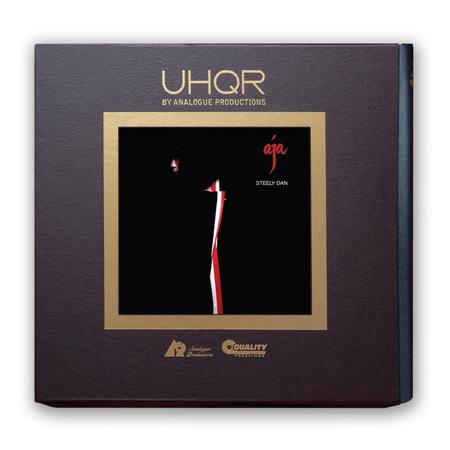When All Your Dime Dancing Is Through You'll Order UHQR "Aja"
more detail as requested
When I visited Paul Gold's Salt Mastering recently, I asked him why he named his facility "Salt Mastering" and he replied that mastering should be like using salt to season food: you shouldn't taste the salt, it should be used judiciously, only to bring out the intrinsic flavors of the ingredients.
Bernie Grundman's original Aja mastering certainly lived up to that mastering definition, which is why it's considered a great sounding record—and I'm not getting into the "AA" vs "AB" nonsense.
There were two other Aja's of note: one released by Mobile Fidelity (MFSL 1-033) in 1980 cut by Stan Ricker but with mastering credits going to Gary Giorgi and SR, and a more recent one released in 2007 by Cisco Records (CLP-1006) mastered by Kevin Gray and Robert Pincus.
Before writing the short but to the point review that some readers didn't like and others thought was written to please Chad Kassem (which is kind of funny considering how the Pretzel Logic review must therefore have been written to displease CK—neither of which charges are true or make any sense) I listened to Bernie's original cut, to the Mobile Fidelity and to the Cisco kid.
The published review was short because the timing couldn't have been worse: the finished UHQR version arrived as I was preparing to travel to Warsaw for the 2023 Audio Video show and I wanted to get the review on the site before I left on Tuesday the 24th, which I just managed to do, setting it to publish that Friday, which it did.
Though Mo-Fi pressed its edition in Japan on that fabulous JVC "super vinyl" the record has ludicrous amounts of bass—something many Mo-Fi's of that era suffered from, though some listeners enjoy that. The Mo-Fi Sticky Fingers is similarly afflicted but that one is more 'fun' because it's only rock and roll. Ricker and Giorgi scoop the salt onto the Mo-Fi Aja mastering to where the bottom end becomes obtrusive and annoying. They also more lightly but obviously use the shaker on the top end to produce the famous Mo-Fi "smiley face" EQ.
Mo-Fi's version is quiet, the tape was quite fresh and Stan used the Ortofon cutting system. Remember, Mo-Fi founder Herb Belkin worked for ABC-Records and you can be certain or fairly certain Stan worked from the original tape. It's just too bad Stan the bass player and Giorgi the cynic worked to differentiate their version from Bernie Grundman's original. In that they succeeded but too much salt!
Kevin Gray cut the Cisco edition in 2007 at which time he was cutting at his AcousTech Mastering located within RTI's pressing plant in Camarillo, CA. While many great sounding records were cut there for various clients, once Kevin moved to Cohearent in 2010 and again re-did his cutting chain the results were markedly more transparent.
I like to play for people the double 45 of Kenny Burrell's Midnight Blue cut at AcousTech with the one cut for Music Matters at 33 1/3. The latter is far more open and transparent with cleaner, more detailed transients. Those who like soft and warm might prefer the double 45 but for rock the new Cohearent set up is far better (as it is for jazz too!) and the Cisco has both the soft and warm signature and Kevin was cutting with input from client Robert Pincus and using a never clearly identified tape. At best it was a copy of what Bernie Grundman used for the new UHQR, which you can see in the booklet accompanying the UHQR boxed set.
Bernie's cutting system today is better than what he was using in the late '70's. Compare his more recent Joni Mitchell Reprise box set cuts with his '60s era originals. I don't know what happened to the Aslyum box cuts, which didn't sound very good but I've been told that the tapes from that era were not in great shape.
The 1/2" 15IPS Dolby "A" tape Bernie used for the UHQR is a "one off" the master safety. The master no longer exists and not, so I've been told, because it was lost in the 2008 Universal fire. Remember: the Cisco was cut in 2007 a year before the fire.
So I'll repeat: the new UHQR is the best Aja you will hear. I'm 100% confident of that. The tape is quiet, the top end has "fresh tape" sparkle (even though it's obviously not a fresh tape), the balance Grundman achieves is masterful (no pun intended) and not at all salty but it brings out much detail (or it, combined with the Clarity Vinyl formulation's quiet does).
I'm not going to go cut by cut but my first listen brought out in great relief Joe Sample's clavinet as I've never before noticed it, Chuck Rainey's bass line had a solidity missing from Bernie' original cut and the three-dimensional presentation of background singers Clydie King, Rebecca Louis, Sherrie Matthews and Venetta Fields was a new sensation (admittedly to a certain degree the original pressing had some of that played through the CH Precision P10 phono preamp, itself 6dB quieter than the older P1, which was very quiet to begin with.
Wayne Shorter's sax solo on the title tune sounded remarkably more timbrally complete—it has a fully fleshed out "grandeur" and greater three-dimensionality than on Bernie's original.
And I'll return to the advantages of cutting at 45rpm and ending sides well before the groove radii begin to "crunch" together the engraved waveforms, which attenuates the higher frequencies. Compare "Deacon Blues" at 33 1/3 at the end of side 1 with the UHQR 45 that occupies all of side 2 and concludes well before the grooves get small. The top is all there.
Also, I'm sure you'll hear extended decay with notes lingering longer in space before fading into blackness and more solid, well-defined but not excess bass produced by obvious EQ boost.
But even if you listen without trying to pick apart why what you hear sounds so much more vivid and pleasing, I think you will hear further into the production on every track. All of the mind numbing work that went into this recording both becomes more obvious in that you can better hear the components and better melds together to produce a most pleasing complete whole.
That's what happens when you season with care and Bernie, though not infallible, can still shake with the best of them.









































.png)








